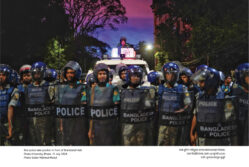Event Coverage Highlight

Author of ‘You Don’t Belong Here’ Chronicles Three Women Journalists Who Blazed Trails Covering the Vietnam War
by Chad Bouchard
In January 1973, journalist and author Elizabeth Becker bought a one-way ticket to Cambodia, within a few months launching her career as stringer for The Washington Post, Newsweek and NBC Radio. She later won an OPC Citation for Excellence for her coverage of Cambodia in 1978. In her new book, You Don’t Belong Here, she profiles the work of three pioneering women journalists who preceded her and broke barriers of discrimination.
“That’s one of the reasons I wrote the book,” she said during an OPC book night on Feb.12. “I owe a debt to these women. I don’t think I could have done it without them, without them paving the way.”
The book follows the careers of Kate Webb, who she described as an Australian iconoclast, Catherine Leroy, a French daredevil photographer, and Frances FitzGerald, “a blue-blood American intellectual.”
Ann Cooper, Professor Emerita of the Columbia Journalism School, moderated the program.
Becker said their stories have remained largely buried for decades, in part because during the era women were not considered qualified to be foreign correspondents, their writing often relegated to women’s sections of newspapers.
She said Webb, reporting for a Sydney newspaper called The Mirror, served as combat correspondent in Vietnam and later in Cambodia became the first woman to serve as bureau chief in a war zone. But she said Webb and the others faced personal and professional challenges after the war.
“At the end of the war, should have been this great legend, she should have been able to name her ticket in journalism, but she quit soon after the war because her boss demanded that she become his mistress, and she didn’t go back to journalism for ten years.”
Becker said FitzGerald, who wrote longform magazine pieces from Vietnam, refused to cover the war solely as combat, policy and the movement of American troops. She cited one of FitzGerald’s articles describing a squalid neighborhood on the outskirts of Saigon where hundreds of thousands of people displaced by the war had landed. “I could not find any other example resembling that,” Becker said.
“I don’t want to say it’s gender per se, but as outsiders, [the three women] were much more interested in the humanity of the story, and they dug deep into what would then be called the ‘locals,’ i.e. the country where the war is being fought.”
FitzGerald’s writing garnered OPC Awards in 1967 and 1974, a Pulitzer Prize for General Nonfiction, the Bancroft Prize for history, and the U.S. National Book Award in Contemporary Affairs.
She said among the three women, Leroy faced the biggest challenges in her career. She was accused of being “course” and vulgar. Men went behind her back to try to get her press credentials revoked at the time, and she suffered PTSD for the rest of her life. She was the first woman to win the George Polk Award and the OPC’s Robert Capa Gold Medal Award.
“My goal was to tell their full stories, to have their voices narrate like a novel through their diaries, their hidden memoirs, to tell excitement, the romance, the obstacles and sacrifices,” she said. “Not just to say they broke the ceiling, but to say that they made their mark in history, that writing the war through their eyes and their work will show the war differently. It will put women back in the center where they belong, and it will say something about journalism – how far we’ve come and how far we have to go.”
During her career, Becker also served as senior foreign editor for National Public Radio and a New York Times correspondent covering national security, economics and foreign policy. She is also the author of WHEN THE WAR WAS OVER: Cambodia and the Khmer Rouge Revolution; and OVERBOOKED: The Exploding Business of Travel and Tourism.
Purchase the book and read more here >>
Click the window below to watch a playlist of video clips from the program.
div>



